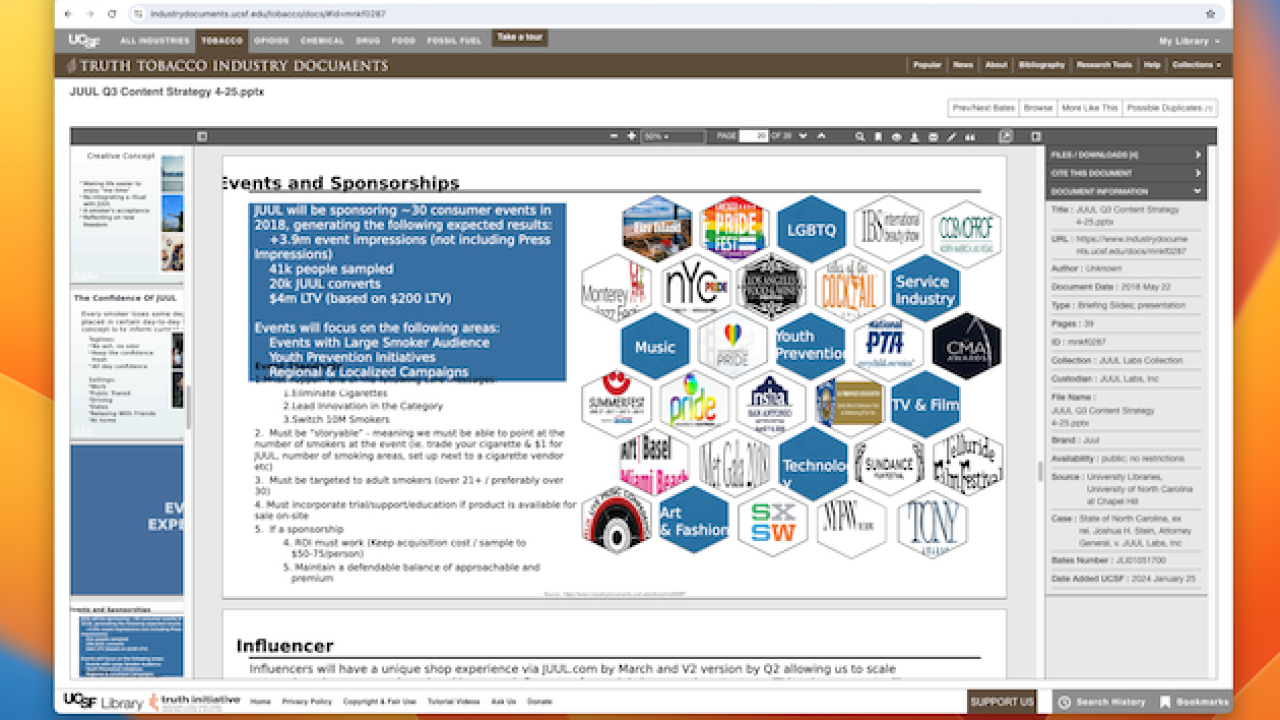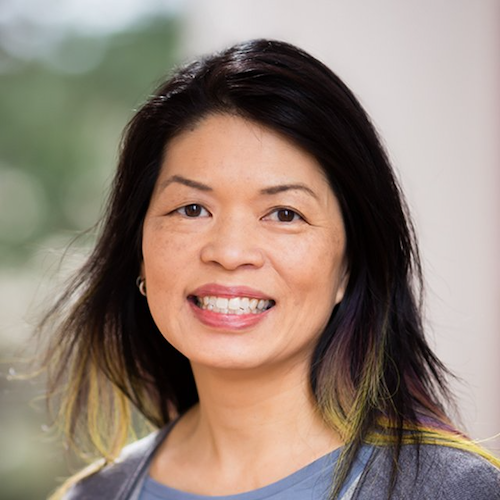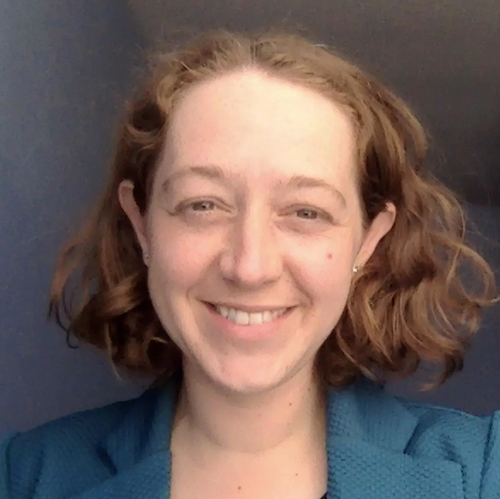
Earlier this month, the UCSF Library announced a partnership between the University of North Carolina at Chapel Hill’s University Libraries and the University of California, San Francisco (UCSF) which will create an online searchable public depository of roughly four million internal documents from the state of North Carolina’s $47.8 million settlement with electronic cigarette maker Juul Labs.
- Access the Collection Now
- Read news from UNC | UCSF
- Lear more about Postdoctoral fellowship program.
The creation of an online depository of these documents was an important condition of the settlement. The first 280,000 documents have been processed and are now available online as part of the UCSF Industry Documents Library. UNC at Chapel Hill and UCSF plan to publish the remaining documents monthly, concluding the project in 2025.
In the UNC at Chapel Hill press release on the collection, María R. Estorino, vice provost for University libraries and University librarian at UNC-Chapel Hill noted “this partnership between UNC-Chapel Hill and UCSF is a perfect example of libraries working together to bring vitally important information directly to the public.”
We asked two UCSF experts, Pamela Ling, MD, MPH, Director of the Center for Tobacco Control Research and Education; and Co-Leader of the Cancer Control Program at the UCSF Helen Diller Family Comprehensive Cancer Center, and Kate Tasker, MLIS, CA, Director of the Industry Documents Library, to comment on the process and implications of this extensive repository for research at UCSF and beyond.

Pamela Ling, MD, MPH: Implications for Tobacco and Cancer Control Research
A: Some of the technical aspects of developing the e-cigarette devices are different than cigarettes, but the JUUL documents will also reveal how lessons learned from the tobacco industry were used to develop and promote e-cigarettes and vaping. Tobacco industry information was used to develop nicotine salts, which allowed for much higher levels and more efficient nicotine delivery. While the e-cigarette/vaping industry tries to emphasize differences from tobacco products, the promotion of e-cigarettes appealing to young people mirrored other tobacco promotions, but now using new tools: social media, influencers, and harm reduction messaging.
A: The JUUL documents can provide insights into the development of the product that were not previously revealed to the public. There may be insights into development of nicotine salts and flavorants in the products that can inform current regulation of e-cigarettes. The documents also reveal that while the company claimed its mission was to provide an alternative to older cigarette smokers, its success was driven by uptake by young people.
A: The documents can show how important flavors were to JUUL’s business model, and appeal to new users. The consumer research on flavors may show how JUUL’s appeal to young people was not an unfortunate unanticipated outcome, but a deliberate strategy. The documents may also reveal tactics JUUL used to weaponize rhetoric and social media to fight tobacco control policies including efforts to eliminate flavored tobacco.
A: The documents may reveal how JUUL used social media to appeal to young people and perpetuate ideas that promote and normalize nicotine use, which can help us address these misconceptions. JUUL did a very good job reaching out to young people on social media, and our cessation programs need to be in that space too.

Kate Tasker, MLIS, CA: On Processing the Collection: Implications for Tobacco and Cancer Control Research
A: These Juul Labs documents are all subject to public disclosure under the terms of North Carolina’s settlement. Close to 4 million documents were sent to the UCSF Industry Documents Library on multiple hard drives, and our team of archivists and software developers is working hard to prepare the files for public use.
This includes screening the documents to make sure that personally identifiable information (PII) such as dates of birth or home addresses has been appropriately redacted; converting files to PDF format where possible for online viewing; loading the documents and associated metadata to our servers; and updating our website and search index to accommodate the new files. We plan to release more documents every month, concluding the project in 2025.
A: The North Carolina settlement specifies that the repository of Juul Labs documents should be overseen by a North Carolina public university, and the NC Attorney General selected the University of North Carolina at Chapel Hill to fulfill that role.
As UCSF has a long history collecting and preserving industry documents released through litigation through its Truth Tobacco Industry Documents and other library collections, UNC invited UCSF to be a collaborative partner on the project and we’re excited to be working with their wonderful UNC Libraries team.
A: Over the past two decades, the documents in the IDL have been cited in more than 1,100 publications by scientists, historians, public health advocates, lawyers, journalists, policymakers, and many others. Research areas range from the effects of secondhand smoke, to investigating industry-funded science, to analyzing corporate efforts to influence regulation and public health policies, to many other topics.
UCSF faculty and students at the Cancer Center and the Center for Tobacco Control Research and Education (CTCRE) have conducted significant research on how the tobacco industry’s marketing practices have targeted young people and other vulnerable populations, and we anticipate that tobacco control researchers will use the Juul Lab documents to continue this work to examine how Juul Labs’ massive social media advertising and promotional activity drove the youth vaping epidemic.
We are also excited that the documents will be used for teaching and training programs, including through CTCRE’s fantastic postdoctoral fellowship program.
Interested in working on research and community engagement with the Juul Labs documents?
Apply now for a postdoctoral fellowship with the UCSF Center for Tobacco Control Research and Education (CTCRE).
- CTCRE fellows are provided with diverse educational and research opportunities, including a grant writing seminar, graduate research positions, advocacy training, and individualized documents training.
- Fellowships are for two years and include on-site work in San Francisco.
- Applications will be reviewed beginning in February 2024.
- For more information and to apply please visit https://tobacco.ucsf.edu/fellowship